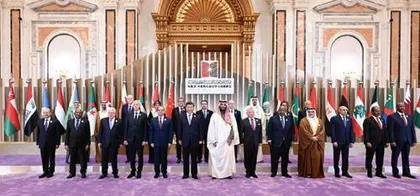Main Manifestations, Causes and Prospect of Leapfrog Development of China-Arab Relations in the New Era
作者: Dong Manyuan

Since their beginning in the1950s, China-Arab relations havegone through stages of getting to know each other, rectifying cogni- tion, gradually expanding friendly exchanges, steadily advancing bilat- eral relations and starting strategic cooperation. All of these stages laid a solid foundation for in-depth develop- ment of China-Arab friendly coopera- tion in the new era. From the 18th CPC National Congress on, guided by Xi Jinping Thought on Diplomacy, major-country diplomacy with Chi- nese characteristics has forged ahead in the Middle East and promoted steady development of China-Arab relations. To build a China-Arab com- munity with a shared future facing the new era, in line with trend of our times and common interests of the people of China and Arab countries, will enable the two great civilizations to complement one another and make unique contributions to the cause of human progress.
MAIN MANIFESTATIONS OF LEAPFROG DEVELOPMENT OF CHINA-ARABRELATIONS IN THE NEWERA
The turmoil in West Asia and North Africa has exacerbated the peace and development deficits in the Arab world, and the long-held Middle East policy of the United States (US) has harmed theinterests of Arab countries and dragged out their revitalization. China’s invest- ment in the Middle East has continued to increase and boost Arab countries’ expansion of self-determination. In making efforts to ease the peace, devel- opment and governance deficits, Arab countries put more trust on China, raising expectations and increasing cooperation. China regards the Arab countries as mutually beneficial peace, development and civilization partners, and has implemented a series of stra- tegic measures to deepen friendship and cooperation with Arab countries. The successful China-Arab “Three-Ring Summit” in December 2022 marked the elevation of bilateral relations to a new height, specifically in the follow- ing aspects.
First, China-Arab political rela- tions increasingly deepen. All of the 22 Arab countries pursue a policy of friendship with China, having formed high-degree of political mutual trust. Arab countries admire China’s achievements, especially that of the fight against poverty, are willing to exchange governance experience with China, and give top priority to developing bilateral relations. Thir- teen of the Arab countries, includ- ing Saudi Arabia and Egypt, have established strategic partnership with China, and the League of Arab States has established Arab-China strategicpartnership featuring comprehensive cooperation, common development facing the future. China and Arab countries mutually support each other with core national interests and major concerns of one another. China staunchly supports Arab countries in their independently choosing politi- cal system and development path suitable to their national conditions, their expanding strategic autonomy, and their restoring unity and com- mitment to collective revitalization. China supports the Palestinian people in restoring their legitimate national rights, supports Arab countries in their struggle against interference in their internal affairs by forces in and out- side the region, their struggle against “islamophobia”, and joins them in the common efforts against the double standards of the West on democracy, human rights and anti-terrorism. Arab countries have withstood pressure and spoken up for justice on the ques- tions relating to China Taiwan,Xinji- ang, HongKong, democracy, human rights and counter-terrorism.
Second, China and Arab countries have forged a relationship featuring mutual economic dependence, mu- tual assistance, and mutual benefit. To carry out equal and mutually benefi- cial cooperation with Arab countries, to boost the regional development and to benefit the people of Arabcountries is one of the main objec- tives of China’s cooperation with Arab countries. By the end of 2022, twenty- one of the Arab countries and the League of Arab States signed the Belt and Road cooperation documents with China, aiming to align their own de- velopment strategies with the Belt and Road Initiative (BRI). Arab countries are generally supportive of China’s Global Development Initiative (GDI). Twelve of the Arab countries joined the Group of Friends of the GDI, and 16 of Arab countries joined the Asian Infrastructure Investment Bank (AIIB). China has become the largest trading partner of 12 Arab countries, powerfully boosting economic devel- opment of both sides. In the Belt and Road cooperation, Chinese enterprises have contracted more than 1,300 key projects in Arab countries. China and Arab countries have forged a relation- ship featuring mutual assistance, mu- tual benefit and mutual dependence in development domain.
Third, Arab countries have signifi- cantly increased their trust in China and raised their expectations for China, becoming more willing to ease the situation in the Middle East by work- ing with it. China has always firmly upheld the international system with the United Nations at its core, the international order based on interna- tional law and the basic norms gov- erning international relations based on the purposes and principles of the UN Charter, which is highly appreci- ated by Arab states. China pursues true multilateralism, opposes unilat- eralism and hegemonism, and speaks up for Arab countries in defense of fairness and justice. Judging by merits and demerits residing in given mat- ters, China participates in efforts for peaceful resolution to hotspot issues in the Middle East in a constructive way, considering reasonable concerns of parties involved, promoting peace through dialogue, and making Arab countries feel being treated objective- ly and fairly, and thus increase their trust in China. Arab countries actively respond to China’s Global Security Initiative (GSI), wish China to play a key role on issues related to Palestine, Yemen, and Sudan, and are willing toaccept China’s mediation on relationsbetween countries having difference.China’s successful mediation for theresumption of diplomatic relations be-tween Saudi Arabia and Iran is highlyspoken of by all Arab countries. Theyhope to apply the mediation modelto other regional hotspot issues so asto further ease tensions in the MiddleEast situation.